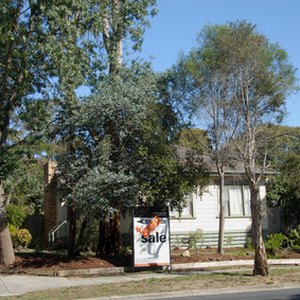
Selling your home is a big financial decision. The hope is that you’ll make a profit so that you can roll your capital gains into a new home. Priced right, a home will sell quickly at a profit. However, if you price your home too high, it will sit on the market unsold while you continue to make mortgage payments on it. If you’ve already moved into a new home, this means you’ll be making double payments until the house sells.
Tips
Consider more than just your property's tax-assessed value when setting your asking price for its sale. Recent, nearby comparable sales and a recent appraisal are more reliable indicators of your home's market value in establishing its sales price.
Property Tax Value
The value that your local taxing authority uses to calculate the property taxes on your home is known as the assessment value. It is supposed to be a reflection of the fair market value of your home. Over time, unless the property is reassessed, a large difference can grow between the assessed value and the market value. This is particularly the case in a rapidly rising or rapidly declining market that outpaces any annual changes in your assessment.
Partial Assessments
Some jurisdictions base their property tax value on a percentage of your assessment. If this is the case where you live, your property tax value will be far below the actual value of your house. For example, if your property tax is based on a 50 percent valuation of your home, the tax on your $300,000 home is only $150,000, which skews the value perception of the home.
Setting Your Selling Price
There’s no limit for how much over your assessment value you can set your selling price. If someone is willing to pay an inflated price for your home, then it means that you will have a greater profit. However, you home will sell easier if it priced near the assessed value. This is assuming that your assessed value is an accurate reflection of the current market in your neighborhood.
Fair Market Value
The selling price you should choose for your home should be close to the fair market value of your home. This is generally determined by looking at comparable homes that have sold recently in your neighborhood. The more similar a home is to your and the more recent it sold, the more accurate your comparable will be.
Comparable homes are ones that are close in lot size, house size, age, condition and number of rooms. Your real estate agent can find the comparable homes in your neighborhood, or you can research this yourself online. You still may need to tweak your asking price up or down to take into account other differences in how the comparable properties compare to yours.
References
Writer Bio
James Rada, Jr. was a newspaper reporter for eight years and earned 23 awards from the Maryland Delaware D.C. Press Association, Associated Press, Society of Professional Journalists, Maryland State Teachers’ Association and CNHI. He also worked for 12 years as a marketing communications writer, earning a Print Copywriter of the Year Award from the Utah Ad Federation. He holds a Bachelor of Arts in communications.

